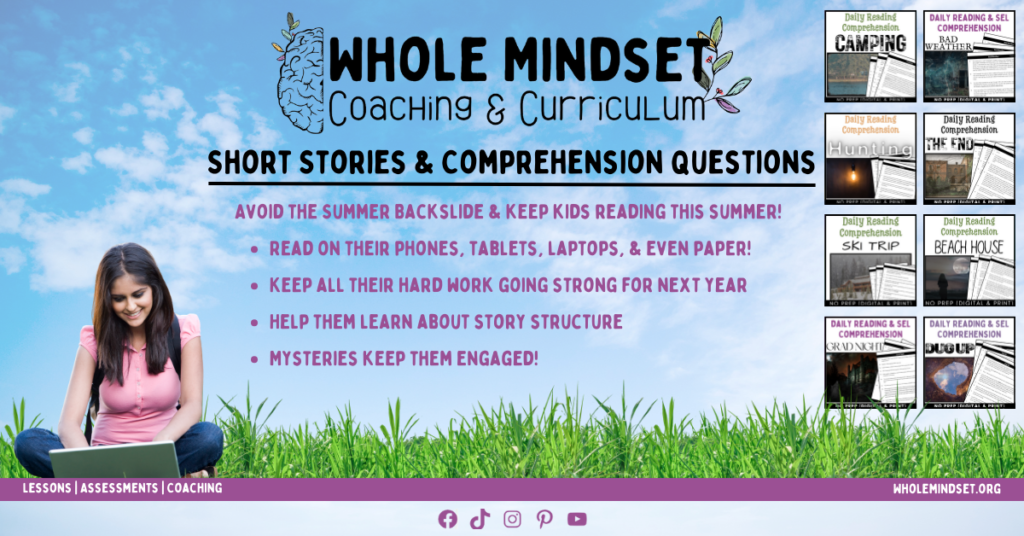Your cart is currently empty!
Important Conversations Build Meaningful and Respectful Relationships
Tough conversations can be scary to have. People often don’t want to confront issues that are stressful or might hurt the other person’s feelings. We can’t hide from these conversations forever though, so it can help to practice them in safe, judgment-free, spaces. One way to do that is look at examples of tough conversations such as in a recent lesson I posted, Grad Night. These two 8th graders are facing a big change; not going to the same high school like they’d always planned. Anger builds, communication fails… The relationship is on the verge of being over forever.
Having tough conversations actually has a lot of benefits though, and can prevent irreparable damage from being done. Here are three reasons to have those tough conversations:
Number one, they are great opportunities for growth. By taking the time to discuss difficult things, we learn about each other and we gain new perspectives. Sometimes we see this growth when students write opinion essays. Within that writing, they share their perspective on a particular topic. For some students, that may be a very difficult or personal topic. I recall my 7th grade English class and a moment that I still regret…
While the teacher was well-intentioned, she caused me and probably other students immense grief. It was an activity in which she would randomly pick a student, they would (of course) have to stand at the front of the room, and she would state a topic. The student, literally and figuratively put on the spot had to respond without ANY prep. I think the purpose was to open discussion on said topic. My topic? Plastic surgery. My view (when I was 11 and had never given it a single second of thought)? I said I believed that people should stay natural.
There, in the front row, looking right at me, was a classmate that had just returned from months of intense surgeries, including lots of reconstruction and plastic surgeries, after almost dying from severe burns. To this day, the look in his eyes, the utter silence that fell over the room… I was just being honest. What the hell does a typical 11 year old know about plastic surgery??? I was mortified, probably 50 shades of red, and the class began to berate me about all the good things plastic surgery does. Even now, it still makes me tense thinking about it…
The moral here, besides not torturing perfectly innocent and well meaning students, is that tough conversations can help people learn a new perspective they may not otherwise be aware of. It can help close gaps in understanding about cultures, thoughts, and behaviors.
Number two, tough conversations provide clarity. Ambiguity can cause all sorts of problems, but if we have the hard conversations it clears all that up and everyone can relax. All through earning my adolescent developmental counseling degree as well as my teaching degree, the concept of boundaries was addressed over and over. Basically, when children have healthy boundaries (consistent bedtimes, chore expectations…) they think more clearly and feel more loved. I still remember the girl who lived down the street from me from age 7 to 13. She was a year younger than me, but we were inseparable.
You could say my parents were rigid; dinner at 5 every night until my mom passed away when I was 20. And if I weren’t home when those street lights came on – Well, I was always home by then so I don’t know what my fate would have been. My friend though, was always out and about, never had to check in, her parents likely had no idea there were even street lights outside let alone where their daughter was. I never envied her though. Even at that young age, I could see that boundaries were nice. Sad to say, the few times she and I have been in touch over the years, she clearly struggles with finances, substance use, and employment, not to mention relationships.
As a parent myself, it is interesting to see boundaries from another perspective; setting them and upholding them. I’m nowhere near as strict as my parents were, but my kids definitely recognize their boundaries. It gives me a warm fuzzy feeling inside when I see them make the choice to stay within their boundaries even if they don’t know that I’m watching or they could make a bad choice without any real consequences. But they choose wisely because they respect their boundaries.
As long as the boundaries we set are logical, then kids will feel safe and loved within them. The same goes for tough conversations; if it provides clarity, then our kids will learn that those tough conversations are rewarding and worth having.
Lastly, tough conversations help develop strong trust and respect within a relationship. Imagine your partner lost their job and didn’t tell you because they thought you would judge them. Is that trust or respect? Definitely not. But if they lost their job and came to you to talk about it and how to move forward, that shows immense trust and respect. They know their fragile feelings will be safe from harm when they have a tough talk with you.
Just after my divorce started, I caught my daughter in a lie. She was 13 at the time and had never so much as been late to school. Essentially, she wanted to hang out with a boy but thought I’d tell her no because I didn’t know him. So she said she was with her friend, but she made the classic mistake of not telling her friend she was using her in a lie. So when I called her friend because something came up, her lie was exposed. When my daughter and I talked about it that evening, there were no raised voices, just open communication. I asked her why she felt she had to lie, what she thought her punishment should be, what she thought she should do differently in the future… That sort of talk. It was a tough conversation, but I knew it was meaningful.
She wrote an essay about the importance of being honest and that rules are there for a reason, she was grounded for a week, and she apologized to her friend for putting her in that position. She created the punishment and I was proud of her for taking responsibility. Since that situation, she has been more open about wanting to hang out with people I haven’t met before, but she also is patient when I ask her a dozen questions about them. Ultimately, we have developed a trusting and respectful dialogue by having that tough conversation early on.
It’s important to keep in mind that the term is tough conversations, not tough yelling matches or scream fests – conversations. That means two-way dialogue in which each side listens and respects one another as they speak. Many students have never witnessed a true conversation. Therefore, opening their eyes to the benefits of it can be life-changing.
In the end, tough conversations can help us grow as individuals and as a society, they can provide clarity, and they can build trust and respect within relationships. As teachers, we need to model this for our students. Students need to be willing to learn about and try having tough conversations. The sooner we all confront difficult talks, the sooner we can grow and change for the better.
If you are facing difficult topics and aren’t sure what to do, Whole Mindset has coaching available. Current and retired teachers get a 30% discount, thank you for your dedication!
Subscribe to the Whole Mindset newsletter for a 100% spam-free publication with freebies, subscriber-only sales, and new podcast episode releases!
When you join, you get one of my best-selling lessons FREE!


